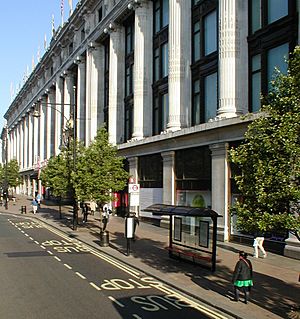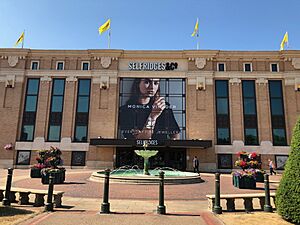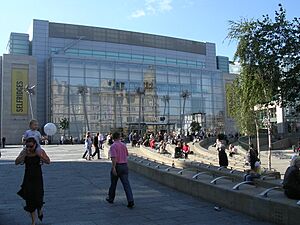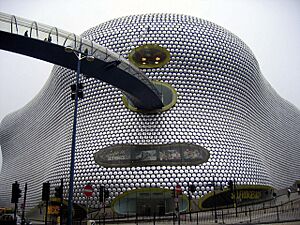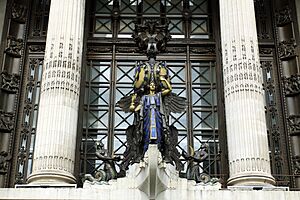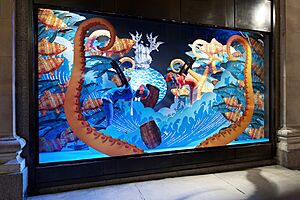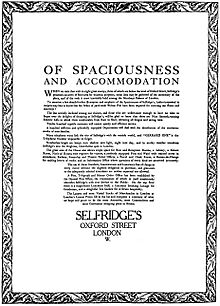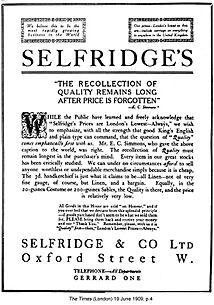Selfridges facts for kids
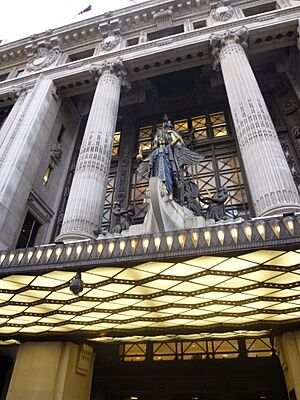
Selfridges flagship store in London
|
|
|
Trade name
|
Selfridges |
|---|---|
| Private limited company | |
| Industry | Retail |
| Founded | 1908 |
| Founder | Harry Gordon Selfridge |
| Headquarters | 400 Oxford Street London, United Kingdom |
|
Number of locations
|
4 (2024) |
|
Key people
|
Andrew Keith (Managing Director) |
| Services | Department stores |
| Parent | Selfridges Group |
Selfridges, also known as Selfridges & Co., is a famous chain of department stores in the United Kingdom. It was started by Harry Gordon Selfridge in 1908. The main Selfridges store, designed by Daniel Burnham, opened on 15 March 1909 at 400 Oxford Street in London. It is the second-largest shop in the UK, right after Harrods. Other Selfridges stores are located in Manchester (at the Trafford Centre since 1998 and Exchange Square since 2002) and in Birmingham (at the Bullring since 2003).
Over the years, Selfridges has changed owners a few times. In 2003, a Canadian businessman named Galen Weston bought the chain. Later, in December 2021, the Weston family agreed to sell most of the Selfridges Group to a joint venture. This new ownership included the Thai company Central Group and Austria's Signa Holding. The sale was completed on 23 August 2022. In 2024, after Signa faced financial problems, Saudi Arabia's Public Investment Fund (PIF) bought Signa's shares. Now, Central Group and PIF are the co-owners of Selfridges.
Contents
The Story of Selfridges
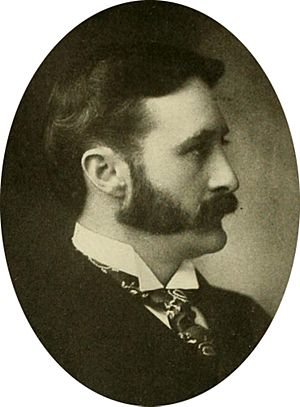
Harry Gordon Selfridge, who came from America, was very good at marketing. He wanted shopping to be a fun adventure, not just a chore. He turned his Oxford Street store into a social and cultural place. It was a comfortable space where women could enjoy themselves. He made sure customers could easily see and touch products. He also put the perfume counter right at the front, which was a very smart move.
Some people say that Harry Selfridge, or perhaps Marshall Field, first said the famous phrase, "the customer is always right."
In 1909, after the first flight across the English Channel, Louis Blériot's Blériot XI airplane was shown at Selfridges. About 150,000 people came to see it over four days! Later, from 1 to 27 April 1925, John Logie Baird showed the first public demonstration of moving silhouette images by television from the first floor of Selfridges.
In the 1920s and 1930s, the store's roof was a lively place. It had gardens, cafes, a mini golf course, and even a gun club for girls. The roof offered amazing views of London and was often used for fashion shows.
During the Second World War, the store's basement became an air-raid shelter. Employees would take turns watching for bombs during air raids.
In 1932, a special machine called a seismograph was set up on the third floor of the Oxford Street store. It was attached to a main support beam, so it wasn't affected by traffic or shoppers. This machine successfully recorded the Belgian earthquake on 11 June 1938. In 1947, it was given to the Science Museum.
A secret communication system called SIGSALY was kept in the basement from 1943. This system made sure that phone calls between American and British leaders, like Winston Churchill and Franklin D. Roosevelt, were safe from spying.
In 1926, Selfridges started a company for stores outside London. These stores were sold to the John Lewis Partnership in 1940. The Liverpool-based Lewis's chain bought the Oxford Street store in 1951. In 1965, the business was bought by the Sears Group. Selfridges then opened new stores in Manchester and Birmingham. In March 1998, Selfridges launched new branding when the Manchester Trafford Centre store opened.
In September 1998, Selfridges opened its first store outside London at the new Trafford Centre in Greater Manchester. This store was very successful. So, Selfridges decided to open another store in Greater Manchester. A new store in Exchange Square, Manchester city centre, opened in 2002.
A large store also opened in 2003 at Birmingham's Bull Ring.
There were plans to open more stores in places like Leeds, Liverpool, Dublin, and Glasgow. However, these plans were put on hold in 2003 when the company started talks to sell the business. The Glasgow site was sold in 2013, and no new stores have been announced since.
In October 2009, Selfridges brought back rooftop fun with a pop-up restaurant called "The Restaurant on the Roof." In July 2011, a company called Truvia created a green boating lake on the roof, complete with a waterfall and a cocktail bar. In 2012, the "Big Rooftop Tea and Golf Party" offered afternoon tea and a nine-hole golf course with famous London landmarks made of cake as obstacles.
In August 2020, Selfridges started offering luxury items for rent. They partnered with HURR, an online fashion rental platform. This allowed customers to rent items from over 40 fashion brands for up to 20 days.
In July 2021, the Weston family decided to sell the Selfridges business. On 24 December 2021, it was announced that most of the Selfridges Group was sold to a joint venture. This included the Thai company Central Group and the Austrian Signa Holding. In 2024, after Signa faced financial difficulties, Saudi Arabia's Public Investment Fund (PIF) bought Signa's shares. Now, Central Group owns 60% and PIF owns 40% of the Selfridges Group.
Amazing Architecture
Selfridges stores are known for their cool and unique designs. They are often tourist attractions themselves. The original London store was designed by Daniel Burnham. He also designed the main Marshall Field's store in Chicago. Burnham was a top American department store designer at the time.
The London store was built in stages. The first part used a steel frame, which was one of the first times this method was used for a building like this in London. This helped make steel frame construction popular in the UK. Other architects, Francis Swales, R. Frank Atkinson, and Thomas Smith Tait, also helped design the store. The colorful sculpture above the Oxford Street entrance was made by British sculptor Gilbert Bayes.
The Daily Telegraph newspaper even called Selfridges in London the world's best department store in 2010.
The Birmingham store was designed by architects Future Systems. It is covered in 15,000 shiny aluminium discs on a bright blue background. Since it opened in 2003, the Birmingham store has been named one of the top 100 stores to visit in the world every year.
Creative Window Displays
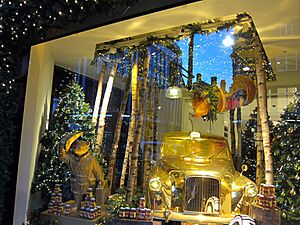
Selfridges' window displays are very famous and are a big part of the brand. Harry Selfridge believed shopping was like going to the theatre. He would cover his display windows with silk curtains and then dramatically reveal the displays on opening day. When the building was being fixed, the scaffolding was covered with a huge photo of stars like Sir Elton John. For Christmas 2014, one window showed a Paddington Bear statue designed by Kate Moss. This "Goldie Bear" was later sold to raise money for the National Society for the Prevention of Cruelty to Children (NSPCC).
Since 2002, a photographer named Andrew Meredith has taken pictures of the windows. These photos have been shown in many magazines and media around the world.
Opening Day and Marketing
Harry Selfridge had a huge impact on shopping and department stores, which was clear from Selfridges' opening day. The store opened with a lot of excitement on 15 March 1909. This set the stage for the success of the whole shopping experience Selfridge wanted to create. Even before the window displays were shown, clever marketing helped make the opening a big event.
Harry Selfridge worked closely with the media to make sure his store and its opening were well-known. The opening week's advertising mainly used free promotions like news articles in newspapers and magazines. Later, Selfridge wrote daily columns under the name Callisthenes. One of the most effective marketing tools was the cartoons about the grand opening. Selfridge hired thirty-eight of London’s best artists to draw hundreds of advertisements for eighteen newspapers.
The marketing continued on opening day itself. Selfridges was called “London’s Greatest Store” and quickly became a cultural and social hit. Everything about the opening was planned to make shopping a special experience. From the soft lighting to the lack of price tags and live music, every detail made shoppers feel unique. At Selfridges, shoppers entered a different world where they were called "guests." They could buy special items not found in other stores.
Selfridges in Pop Culture
ITV and Masterpiece made a TV series called Mr Selfridge, which was shown from 2013 to 2016.
Selfridges was also featured in the 2017 movie Wonder Woman. In the film, Steve Trevor takes Diana Prince to Selfridges to help her get modern clothes.
The brand has also worked with artists like Jaden Smith over the years.
See also
- Bloomingdale's
 | Emma Amos |
 | Edward Mitchell Bannister |
 | Larry D. Alexander |
 | Ernie Barnes |


